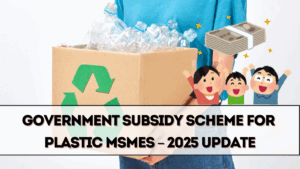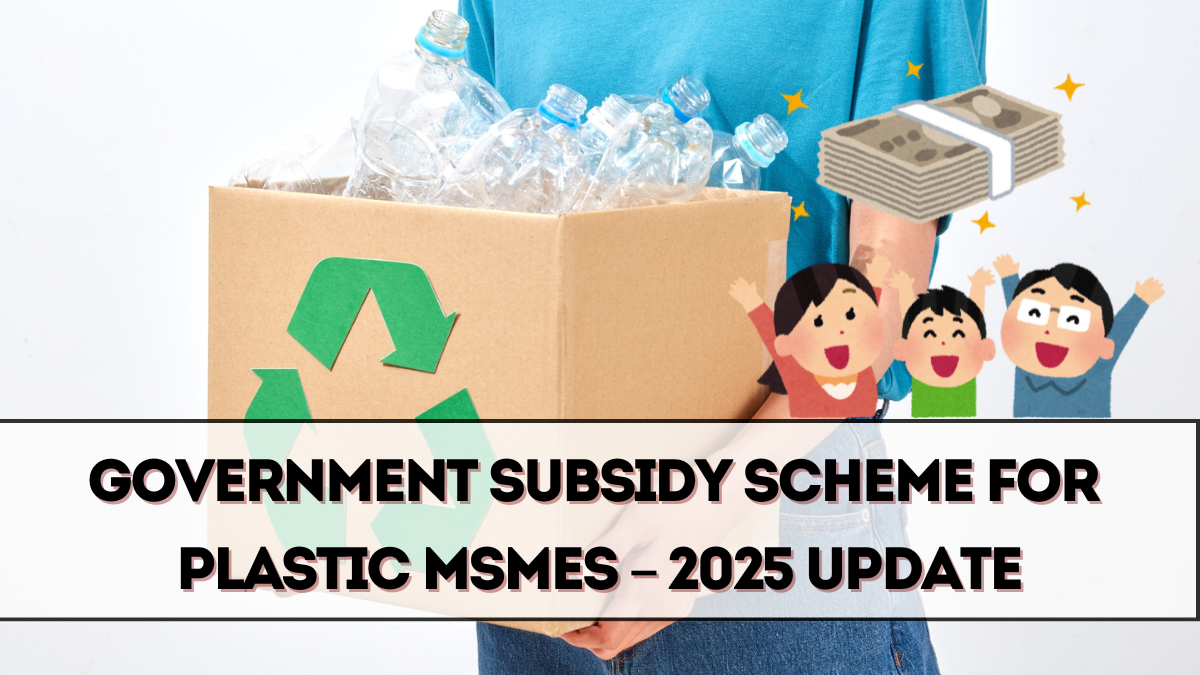India’s plastic manufacturing industry is a vital part of its economy, supporting packaging, automotive, consumer goods, and healthcare sectors. A significant portion of this industry consists of micro, small, and medium enterprises (MSMEs). In 2025, the government announced the Plastic Industry Subsidy 2025 scheme to empower MSMEs, enhance competitiveness, and promote eco-friendly production methods. This subsidy comes at a time when the industry is transitioning toward sustainability and facing global challenges in cost and regulation.

Why the Subsidy is Important for MSMEs
MSMEs account for nearly 90% of India’s plastic manufacturers, employing millions and contributing significantly to exports. However, these units often struggle with:
-
High costs of raw materials.
-
Limited access to modern technology.
-
Pressure to shift toward sustainable production.
-
Competition from global manufacturers.
The Plastic Industry Subsidy 2025 directly addresses these issues by providing financial support, encouraging innovation, and promoting compliance with eco-friendly standards.
Key Features of the Subsidy Scheme
The subsidy is designed to benefit MSME units across India. Some important highlights include:
-
Capital Subsidy: Up to 25–30% support for purchasing modern machinery and equipment.
-
Technology Upgrade Assistance: Special funds to help MSMEs adopt eco-friendly and energy-efficient technologies.
-
Raw Material Support: Subsidized rates for biodegradable and recycled raw materials.
-
Export Incentives: Rebates for MSMEs that export plastic products, ensuring global competitiveness.
-
Green Compliance Aid: Financial support for companies adopting sustainable production under extended producer responsibility (EPR) guidelines.
This comprehensive approach ensures that MSMEs not only survive but thrive in a changing global market.
Eligibility Criteria for MSMEs
Not all enterprises can automatically benefit from the Plastic Industry Subsidy 2025. The eligibility criteria are as follows:
-
Must be a registered MSME under the Ministry of MSME, Government of India.
-
Engaged in plastic product manufacturing, packaging, or allied sectors.
-
Compliance with environmental regulations is mandatory.
-
Preference given to units adopting biodegradable or recycled plastic production.
-
Enterprises must maintain proper financial records and tax compliance.
By focusing on responsible businesses, the government ensures long-term benefits for both the industry and the environment.
Benefits for MSME Units
The subsidy provides multiple advantages for small and medium manufacturers:
-
Reduced Production Costs: Subsidies on equipment and raw materials make operations more affordable.
-
Improved Competitiveness: With access to modern technology, MSMEs can compete with larger companies.
-
Market Expansion: Export rebates allow Indian firms to expand globally.
-
Sustainability Support: Funds for eco-friendly practices help MSMEs comply with green policies.
-
Employment Growth: As businesses expand, more jobs are created in the plastic sector.
These benefits collectively boost India’s position as a leader in the global plastic manufacturing industry.
Government’s Focus on Sustainability
The Plastic Industry Subsidy 2025 is not just about supporting MSMEs financially but also about encouraging responsible production. The scheme promotes:
-
Use of bioplastics and recycled plastics.
-
Reduction of single-use plastic items.
-
Investments in energy-efficient machinery.
-
Training programs for MSME employees on sustainable practices.
This alignment with India’s environmental goals ensures that growth in the plastic industry does not come at the cost of ecological harm.
Comparison with Previous Subsidy Schemes
Earlier subsidy schemes primarily focused on capital investment and infrastructure. The 2025 update is more comprehensive, addressing raw material costs, green technology, and exports. By including sustainability incentives, this scheme is more relevant in today’s global context where environmental concerns dominate trade discussions.
How MSMEs Can Apply for Subsidy
MSMEs can follow these steps to avail themselves of the subsidy:
-
Register on the MSME Portal: Ensure updated business details.
-
Submit Application: Apply through the official subsidy scheme portal with required documents.
-
Provide Compliance Proof: Submit certifications related to environmental standards.
-
Await Verification: Authorities will verify documents and eligibility.
-
Receive Subsidy: Approved enterprises receive financial support directly into their accounts.
Digital platforms make the process transparent and accessible for all small manufacturers.
Challenges in Implementation
Despite the positive outlook, some challenges exist:
-
Smaller units may struggle with paperwork and compliance requirements.
-
High upfront costs even after subsidies could discourage participation.
-
Lack of awareness among rural MSMEs about government schemes.
To overcome these issues, the government is partnering with industry associations to spread awareness and offer technical guidance.
Future of Plastic MSMEs in India
The Plastic Industry Subsidy 2025 is a stepping stone toward a stronger, sustainable, and globally competitive plastic sector. The roadmap for the future includes:
-
Expansion of subsidies for start-ups focusing on biodegradable plastics.
-
Development of regional clusters with common recycling facilities.
-
Greater emphasis on R&D for innovative plastic alternatives.
-
Stronger export support to make India a global hub for eco-friendly plastic products.
These measures will ensure that India’s plastic industry remains a vital contributor to both the economy and sustainable development goals.
FAQs
Who can apply for the Plastic Industry Subsidy 2025?
Registered MSME units engaged in plastic manufacturing or packaging that comply with environmental standards can apply.
How much subsidy is provided under the scheme?
Enterprises can get 25–30% capital subsidy along with support for raw materials, exports, and sustainable practices.
Does the subsidy cover eco-friendly plastics?
Yes, special incentives are provided for MSMEs using bioplastics or recycled raw materials.
How can MSMEs apply for the subsidy?
They can apply through the official MSME government portal by submitting business and compliance documents.
Click here to know more.




